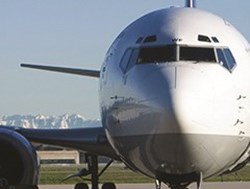Aviation and climate change: Sustainable aviation fuels
In this IIL aviation webinar, Michael Gill discussed aviation’s long-term strategy to address its climate change impact through a range of emissions reductions initiatives, with a particular focus on the deployment of sustainable aviation fuels on a commercially viable basis.
In 2008, leaders from across the industry committed to a strategic vision for aviation’s sustainable development. This unprecedented commitment saw aviation become the first global transport industry to have a long-term plan to tackle its climate change impact. This commitment by the industry has placed aviation a step ahead of many other industries and provided the impetus towards the United Nation’s International Civil Aviation Organization’s (ICAO) historic decision to introduce a regulatory framework to reduce aviation’s emissions in 2016. As part of this commitment, working through the Air Transport Action Group (ATAG), the sector developed a set of environmental goals for the short, medium, and long-term:
- Improving fuel efficiency by an average of 1.5% per year from 2009 to 2020
- Stabilising emissions from 2020 with carbon-neutral growth
- An aspirational goal to reduce net emissions from aviation by 50% by 2050 compared to 2005 levels
Since 2008, aviation has made outstanding progress. The short-term fuel efficiency goal is already being more than met and, in October 2016, the ICAO Assembly agreed on the implementation of the Carbon Offsetting and Reduction Scheme for International Aviation, the economic mechanism by which the second goal of carbon-neutral growth will be enabled.
Sustainable aviation fuels (SAF) represent a huge opportunity for aviation to reduce its environmental impact. These fuels, which are almost chemically identical to traditional fossil-based fuels, can be up to 80% less carbon-intensive over their lifecycle and can be synthesised using a number of sustainable, renewable feedstocks such as used cooking oil, forestry residue or municipal waste.
The aviation industry has been pushing for the implementation of policies that would allow the commercialisation of these alternative fuels and drive progress towards the industry’s long-term emissions reduction goal to be realised.
By the end of this webinar members would have gained an insight into:
- What the aviation industry has done to address its long-term impact on climate change
- How the sector can move towards even more ambitious action to reduce CO2 emissions
- The key role that Sustainable Aviation Fuel will play in helping the industry achieve its targets
Due to the interactivity of the event, places are limited (250 places) and will be allocated on a first come, first served basis.
This webinar will be hosted on Microsoft Teams. Please familiarise yourself with their T&Cs and Privacy Statement.
Venue
- Online event
Booking information:
You will be sent a confirmation email shortly after booking. If you have not received this within one hour, please contact Patricia Pedraza (020 7397 3911).
CII Accredited
This demonstrates the quality of an event and that it meets CII member CPD scheme requirements.
1 hour's CPD can be claimed for this event if relevant to your learning and development needs.
It is recommended that you keep any evidence of the CPD activity you have completed and upload copies to the recording tool as the CII may ask to see this if your record is selected for review. Details of the scheme can be viewed online at www.cii.co.uk/cpd.

